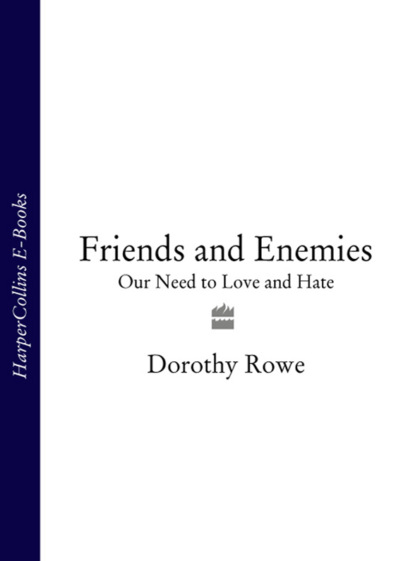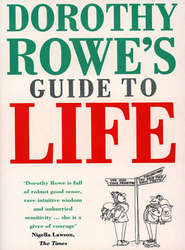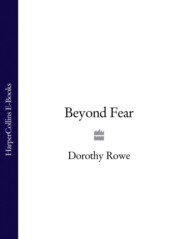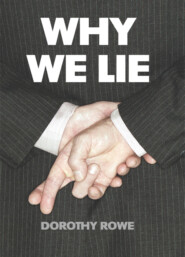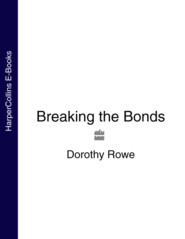По всем вопросам обращайтесь на: info@litportal.ru
(©) 2003-2024.
✖
Friends and Enemies: Our Need to Love and Hate
Автор
Год написания книги
2018
Настройки чтения
Размер шрифта
Высота строк
Поля
• ‘Someone who will be honest with me but care about my feelings at the same time. Importantly, someone I feel comfortable with, easy with, have fun with.’
• ‘A friend is able to accept things you do for them.’
• ‘They need to tell me, show me, they care for me.’
• ‘We share a similar morality.’
I also asked some of my own friends how they defined a friend. Sometimes their answers surprised me.
I had always thought that Elizabeth and Catherine were close friends. They shared considerable work interests and an extensive social life. Yet Elizabeth said of Catherine, ‘I speak of her as a friend, we do the things friends do, but she is not simpatico.’ Elizabeth went on to point out that simpatico is an Italian term with no equivalent word in English. She contrasted her relationship with Catherine with her relationship with someone she has known since college. This is what she calls ‘eternal friendship’, even though she and her friend now see one another rarely.
I have been friends with Judy since 1954, and I regard this as one of my achievements. I love Judy dearly, but in my youth I was always afraid that I would not live up to the high standards Judy set for her friends. Now I am older and wiser I was able to ask her about how she saw friends and enemies. She told me she defined friends as ‘People who like me and are faithful to me. They have to be totally faithful.’
I asked her what was involved in being faithful.
‘They don’t cause trouble amongst other friends. They don’t bitch me up too much. They’re allowed to say a few things about me because I don’t think anybody could go through life not talking about their friends, but they should say positive things about me as well, so that if things come back to me I can say, “That’s fair. I can understand why they said that.”’
Judy’s demand that her friends be totally faithful to her is matched by the love and care she lavishes upon her friends. I have noticed that those people who feel that they have much to offer as a friend and who, like Judy, lavish much time and effort upon their friends are not always greatly surprised when their friends respond in kind, whereas those people whose top priorities include more than friendships can be surprised and entranced by what a friend might do for them.
I first met Irene when we were both in our twenties. Each of us had married the same kind of man – selfish, self-centred, someone who demanded that his wife give him her full attention and not fritter away any of her time with friends. In the 1950s this was a typical male attitude. However, Irene understood the importance of friendship better than I did, and she looked after her friends better than I did then. Now, forty years on, Irene has many friends acquired over many years. When I asked her whether she had a talent for friendship she said, ‘I do spend a lot of time socializing, but I’m also a disciplined sort of person time-wise, and so I’ve got my own programme that I follow, and if somebody says, “What about doing such and such?” I’ll say, “I can’t manage that until later in the day” – because I’m going swimming, or I’ve got calligraphy, or yoga.’
A few months after this conversation Irene had an accident and injured her hand most severely. She emerged from the casualty ward with her whole arm in plaster and strapped across her chest. This quite ruined her plans for the coming weekend, when her friend Amy was due to arrive for a short holiday. Now Irene knew that it would be a most uncomfortable time for Amy, so she rang her and explained the circumstances. She suggested that Amy should postpone her holiday until she, Irene, was capable of carrying out a hostess’s duties. She said, ‘Amy, if you come now you’ll just be my handmaiden for the whole of the time.’
Amy laughed and said, ‘It is better to be a handmaiden in the temple of the Lord than an honoured guest in the tents of the wicked.’ Amy arrived soon after and proved to be a most industrious handmaiden, though her attempt to remove some immovable spilt glue from the kitchen floor by scrubbing it with a nail brush was, Irene felt, one task too far. Amy is, Irene told me, ‘a dear lady and a very dear friend’, but words on paper cannot convey Irene’s astonishment and sense of blessedness.
Irene, like me, did not have a childhood where love and a sense of blessedness came as a birthright. I can see what effect such a childhood had on me. I know that there are people who demand much from their friends. I’ve often had to listen to a torrent of disappointment, anger and sadness from such a person who felt betrayed or let down by a friend. Intellectually I can understand the person’s point of view, but, in my heart, I am surprised that anyone can demand so much of a friend, and I get anxious lest to reproach a friend might drive that friend away. I do not expect anything of friends except that they will be nice to me when I am with them, and that behind my back they will speak about me with kindness. If they do not they are not friends. My expecting little of my friends arises not from some great wisdom but from growing up in a family where I found that to ask for anything was to risk refusal and ridicule. When I was a child many shops displayed a sign which read, ‘DO NOT ASK FOR CREDIT BECAUSE A REFUSAL MIGHT OFFEND’. That sign always seemed to epitomize all my relationships. ‘Don’t ask for anything because a refusal always hurts.’
This attitude has meant that I have probably missed out on a great deal, but it also means that anything friends do for me, the smallest gift, the simplest thoughtfulness, comes as a magnificent bonus.
Anthony is one of the warmest, friendliest, kindest people you could meet. When I was in Omagh, Northern Ireland, he took me around, and wherever we went there was someone who greeted him as a friend. Yet, when I asked him how he defined a friend he said, ‘I don’t think I have any friends. I think in your lifetime you’re going to be lucky to meet anyone – two, three at the most, people – whom you could define as friends, in the way that I would perceive friendship. I think friendship develops over years of trust and acceptance, I suppose. For me, I have no recollection of having friends who were unconditional. The friends that I have are friends because it suits them to be my friends, or vice versa. While I think a lot of them, they’re not friends in the sense I think you’re asking me about friendship – except for Anne, my wife, and that friendship took twenty-five years to come about. I’ve told Anne this: when we got married, I didn’t know what love was. I walked up the aisle in hope. She finds it a great source of pain when I say that to her, because she thinks of her wedding day as a day of such love and hope. She can’t believe that I didn’t. I’m totally honest with her. I say, “The experience I had with you is something very special, but I couldn’t really say I loved you until we had ten years of marriage through us, through our lives.” I realized then that I loved her.’
Anthony was the sixth of eleven children born to a bitterly unhappy couple. He said, ‘Friends weren’t encouraged in our family because there was enough of us in the family not to have friends around. God, you wouldn’t have brought your friend round for tea as well! There was already eleven children to feed. So I just keep comfortable distances with people, because of the mask I wear. I would be a person who has to wear a lot of different faces for different people, and I find that difficult in the long term. I feel almost insincere, because the face I would wear for you would be different from the face from the one at work, or home, or whatever. These faces sustain me and carry me through life. For a long time I felt insincere with that, but I’ve learned to make sense of it. I miss that relationship that could be there somewhere. I know I’m very well known and popular, but those people would be at a comfortable distance. Anne is the only person who really knows me. I think, too, I’ve found friendships in books. Certain books, they’re close friends. Books don’t betray you.’
Anthony, I guess, is like me in that I can usually detect in others the wariness that evolves as a defence when a child discovers that he cannot trust the people who should be caring for him. Adult life does little to diminish such wariness because once we discover the treachery of others unconditional trust can never be reborn.
I found this wariness in one of the most delightful people, someone I met in a jazz bar in Beirut, where he worked.
James was magnificently beautiful. Every evening when I was in Beirut I sat at the bar, where he gave out smiles, drinks, food, and listened to the regulars who, like me, were gathered around him. One evening when the bar was quiet James told me that he came from Freetown, Liberia, but as an adult he had lived in various places in Europe where, I gathered though he did not say, life had been hard. When he was young his parents had been Muslim but his aunt, who brought him up, was a Baptist. He’d helped her to look after the church, and he had learned to believe in God – one God for all of us, even though different people had different names for God. He knew that God saw us as being all the same, all sinners. The idea that the colour of a person’s skin or the beliefs that a person held made one person different from another was a human idea, not God’s, and very wrong.
When it came to friendship James waited to see how things turned out. He was very friendly. He bestowed his warm, gracious smile on everyone immediately on meeting and in every interaction and seemed so unlike many of the Beirutis, whom the war had left tense and wary. When I asked him about friends he told me that he might meet a person on one occasion and then on another, and each time all would be right no matter how long the time between meetings, and then, perhaps, they would meet and everything would not be right. So, with all his friends, he would just wait and see how things turned out.
He said, ‘When people say to me, “I love you, James,” or, “I’m your friend,” I wonder what it is they want. I wait, I wait and see what happens.’
I did not ask James what he did if ‘what happens’ was not to his liking. I felt that this would take us into issues of religion and of race, and these were not safe issues to discuss in a bar in Beirut.
However, in South Africa, the enemy is a common topic of conversation. Our guide to the prison where the enemies of the apartheid regime had been incarcerated on Robben Island had been imprisoned there from 1963 to 1978, when prison conditions were at their very worst. He told us, ‘The guards and security were my enemies. Robben Island was my first and last enemy.’
His last enemy has now lost power, and life in post-apartheid South Africa is full of ironies. Ex-political prisoners take visitors to a respectful viewing of cell number five, which once housed Nelson Mandela, while in Johannesburg my guide to another holy of holies, the Voortrekker Monument, was Simbo, a Zulu from Soweto, that south-western township established to separate the blacks from the whites.
The Afrikaner apartheid regime had been based on the belief that God had created blacks inferior to whites in order that they should work for the whites. Mamphela Ramphele, now Vice-Chancellor of Cape Town University, mentioned this in her autobiography. She began her professional education at Bethesda Teacher Training College, which had been started by Dutch Reformed Church missionaries in the 1930s. She described how the white teachers kept their distance from the black students and how the students were compelled to carry out huiswerk (Afrikaans for ‘housework’),
which was a form of forced labour intended to remind students that education was not an escape route from the inferior position blacks were ‘destined’ to occupy … The principal’s wife, Mrs Grütter, who was our music teacher, was the most unpleasant of all [the teachers]. She often reminded those students who seemed to her unenthusiastic in their tasks: ‘You were born to work for us.’
(#litres_trial_promo)
Simbo, like Mamphela, found that his life changed markedly when apartheid came to an end. He obtained a most sought-after job, that of a tourist guide. Simbo drove me to the Voortrekker Monument, which looks like a huge, old-fashioned radio set upon a high hill. It was built to impress on all the implacable power and virtue of God’s own people, the Voortrekkers, who had fought and defeated the Zulu nation and established their own fair land, only to have it taken from them by the treacherous English. Inside the monument Simbo conducted me around the carved frieze on the four walls of the large interior room. Here the history of the Great Trek was depicted, and Simbo knew it well. He pointed out the different characters – the Boer men were all brave and handsome and the women all beautiful and true – and he showed me how the Boers had enslaved the blacks.
When we had finished our tour of Pretoria and set off back to Johannesburg I asked Simbo if he had any enemies. In answer he spoke of individuals who might know him personally but did not wish him well.
I asked him how he felt about the Afrikaners. I said, ‘When I was here last in 1991 you wouldn’t have been allowed anywhere near the Voortrekker Monument.’
He smiled and talked gently about the pass laws which restricted black and coloured people to certain areas. ‘See those women?’ he said, pointing to two African matrons walking home from work. ‘If they’d been there and didn’t have their pass book they’d be arrested and put in jail. Now I don’t mind the Afrikaners, provided they join with us and make this one country, all of us together.’
The Voortrekker Monument was for him a fine thing. It had given him what he wanted most – a job.
In Lebanon enemies still have power and so it was only in the privacy of a car that I was able to ask Samir, my driver, about friends and enemies as we spent three days together touring Lebanon. He was a large man in his late forties and knew Beirut and the roads in Lebanon and into Syria like the back of his hand.
One day I commented to Samir that wherever he stopped he got into conversation with someone. He seemed to have friends everywhere. He said, ‘I want to have friends everywhere and no enemies.’
I asked him if he had any enemies.
He shrugged. ‘How can you tell? You don’t know who your enemy is. Someone can come smiling, saying, “I am your friend,” and then, when you’re not looking, he hits you in the back.’
I asked a stupid question: ‘Are the Israelis your enemy?’
‘They are everyone’s enemy.’
Samir had good reason to regard the Israelis as enemies. In the war he had been a driver for foreign journalists, which meant he was often in danger of being killed by the Israelis or their allies. However, Samir’s interest in enemies went much wider. On our travels I discovered that he favoured the conspiracy theory of history. He was sure that Princess Diana had died as a result of a conspiracy by the Israelis and the royal family who, on discovering that the Diana-Dodi romance had resulted in her pregnancy, had had her killed. He was equally sure that Monica Lewinsky had been instructed by international Jewry to bring down President Clinton.
Over lunch in a garden in Balbek I gave Samir the benefit of my extensive knowledge of the royal family, garnered over the years that journalists have been asking me to comment on the latest events in the royal soap opera. I am a firm believer in the ‘cock-up’ theory of history rather than the conspiracy theory. I know that people conspire together, but I also know that stupidity usually triumphs. I assured Samir that Diana’s death was an accident, a result of the belief which many drinkers hold – that they drive better when they are drunk. Samir was completely unconvinced. He knew for certain that it was a conspiracy between the royal family and the Israelis to bring down not merely Diana but Dodi and thus strike at Dodi’s father, Mohammed al Fayed. I could see from his expression that he thought I was very naïve.
I should have remembered Robert Fisk and The Plot, and held my breath. Anyone who wants to try to understand why Lebanon, once a rich and flourishing country, is now in a state where a long, vicious war has ended but peace has not been made must read Robert Fisk’s Pity the Poor Nation. Of Lebanon after the war he wrote,
The events of the 1975–6 civil war have become a fixation for the Lebanese. Even today, the bookshops of Hamra Street and Sassine Square contain shelves of expensive photographic records of the fighting, coffee table books with colour plates in which readers can study at their leisure and in detail the last moments of a young Muslim militiaman before the firing squad, the anguished eyes of a Palestinian mother pleading for her family before a hooded gunman, a Christian family lying massacred inside their home. It is a kind of catharsis for both the Lebanese and the Palestinians who have long understood the way in which these terrible events should be interpreted. Victories were the result of courage, of patriotism or revolutionary conviction. Defeats were always caused by the plot: The Plot, the mo’amera, the complot, undefinable and ubiquitous, a conspiracy of treachery in which a foreign hand – Syrian, Palestinian, Israeli, American, French, Libyan, Iranian – was always involved. Edward Cody of the AP and I once came to the conclusion that in every interview we conducted in the Lebanon, a special chair should be set aside for The Plot – since The Plot invariably played a leading role in all discussions we ever had with politicians, diplomats or gunmen.
(#litres_trial_promo)
Jean Said Makdisi, in her glossary of terms used in times of crisis, linked The Plot to The Plan and explained that ‘The reader should not expect proponents of conspiracy theories to show alarm at their pervasiveness. Rather, a certain perverse comfort is taken from the assurance that someone, at least, knows what is going on and why.’
(#litres_trial_promo)
It is our human nature to create an explanation for everything that happens, even though such an explanation may be entirely speculative and, in many cases, quite far-fetched. We prefer an explanation which enhances our image of ourselves. The thought that someone somewhere is conspiring against us serves to boost our pride. It means that we are so important that other people have to take us into account. The explanation that the suffering of most people in Lebanon was brought about simply because they were in the way when different groups of men, who care nothing for their fellow human beings, were battling for supremacy, is too close to a truth which shows how helpless and insignificant we are in the whole scheme of things. For many people a conspiracy of enemies is preferable because it boosts their sense of personal identity. This is one of the reasons why enemies are necessary.
Asking someone about their enemies is a very intrusive question, and the answers can be surprising. At an Amnesty International party I asked a fellow guest, a strong supporter of Amnesty, whether he had an enemy. He answered immediately, ‘My ex-wife.’ People can talk about their friendships without revealing much about themselves, but talking about their enemies goes straight to the painful complexities of relationships, as the participants of a workshop showed in their definitions of an enemy. They said,
• ‘An enemy is someone who threatens my safety and leaves me feeling helpless.’
• ‘An enemy is someone who despises you, doesn’t respect you, wishes you were dead.’





